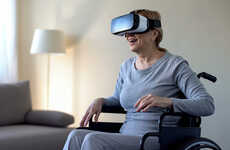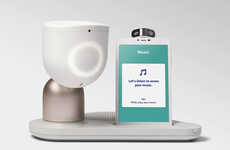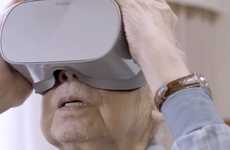

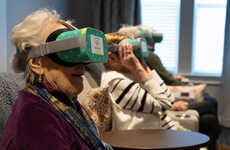
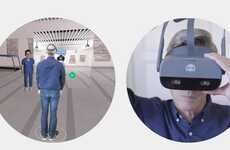
Companies are leveraging virtual reality to enhance elderly peoples' daily lives
Trend - Due to mobility issues and/or other age-related disabilities, senior citizens find it more difficult to connect, travel, exercise, and enjoy outdoor activities. Brands are leveraging the accessibility of the metaverse to create tailored experiences that address these problem areas. Services emphasize social interaction and immersion in the metaverse.
Insight - The pandemic caused levels of perceived isolation to worsen, leading to elderly people feeling even more disconnected from their friends and communities. These individuals found it harder to remain active and access daily services. The rapidly-advancing metaverse arose as a space for innovation in these areas, leading to brands creating curated experiences for elderly people that help with socialization, exercises, mental stimulation, and services such as banking or healthcare.
Insight - The pandemic caused levels of perceived isolation to worsen, leading to elderly people feeling even more disconnected from their friends and communities. These individuals found it harder to remain active and access daily services. The rapidly-advancing metaverse arose as a space for innovation in these areas, leading to brands creating curated experiences for elderly people that help with socialization, exercises, mental stimulation, and services such as banking or healthcare.
Workshop Question - How could your brand take advantage of the metaverse to improve accessibility services for customers?
Trend Themes
1. Elderly Metaverse Experiences - Brands are leveraging the accessibility of the metaverse by creating tailored experiences for elderly people that help with socialization, exercises, mental stimulation, and daily services.
2. Inclusive Social VR Programs - The development of a social VR framework led by Cambridge University and Meta is improving the quality of life, employment prospects, social presence, and physical wellbeing of individuals with disabilities and elderly people.
3. Metaverse Healthcare - Extended reality healthcare and therapeutic applications, such as XRHealth, are partnering with metaverse providers like HTC VIVE to offer physical therapy, occupational therapy, pain management, and psychological services to individuals who cannot easily seek in-person healthcare.
Industry Implications
1. Healthcare Industry - There are opportunities for healthcare providers to adopt extended reality therapies and treatments in the metaverse, using VR/AR/MR to provide patients with virtual visits and personalized healthcare services.
2. Technology Industry - The development of VR/AR/MR metaverse platforms and their required hardware provides opportunities for companies in the technology industry to create innovative and immersive experiences for elderly people, individuals with disabilities, and other segments of the population.
3. Entertainment and Media Industry - The metaverse provides a new platform for media and entertainment companies to create tailored content, including educational television, holograms, virtual vacations, and social experiences, for elderly people and individuals with disabilities.
